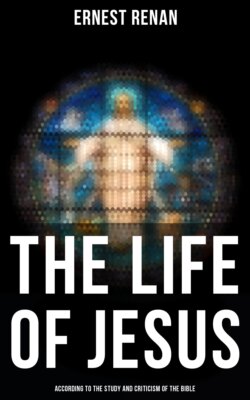The Life of Jesus: According to the Study and Criticism of the Bible

Реклама. ООО «ЛитРес», ИНН: 7719571260.
Оглавление
Ernest Renan. The Life of Jesus: According to the Study and Criticism of the Bible
The Life of Jesus: According to the Study and Criticism of the Bible
Table of Contents
AUTHOR'S INTRODUCTION,
CHAPTER I. PLACE OF JESUS IN THE HISTORY OF THE WORLD
CHAPTER II. INFANCY AND YOUTH OF JESUS—HIS FIRST IMPRESSIONS
CHAPTER III. EDUCATION OF JESUS
CHAPTER IV. THE ORDER OF THOUGHT WHICH SURROUNDED THE DEVELOPMENT OF JESUS
CHAPTER V. THE FIRST SAYINGS OF JESUS—HIS IDEAS OF A DIVINE FATHER AND OF A PURE RELIGION—FIRST DISCIPLES
CHAPTER VI. JOHN THE BAPTIST—VISIT OF JESUS TO JOHN, AND HIS ABODE IN THE DESERT OF JUDEA—ADOPTION OF THE BAPTISM OF JOHN
CHAPTER VII. DEVELOPMENT OF THE IDEAS OF JESUS RESPECTING THE KINGDOM OF GOD
CHAPTER VIII. JESUS AT CAPERNAUM
CHAPTER IX. THE DISCIPLES OF JESUS
CHAPTER X. THE PREACHINGS ON THE LAKE
CHAPTER XI. THE KINGDOM OF GOD CONCEIVED AS THE INHERITANCE OF THE POOR
CHAPTER XII. EMBASSY FROM JOHN IN PRISON TO JESUS—DEATH OF JOHN—RELATIONS OF HIS SCHOOL WITH THAT OF JESUS
CHAPTER XIII. FIRST ATTEMPTS ON JERUSALEM
CHAPTER XIV. INTERCOURSE OF JESUS WITH THE PAGANS AND THE SAMARITANS
CHAPTER XV. COMMENCEMENT OF THE LEGENDS CONCERNING JESUS—HIS OWN IDEA OF HIS SUPERNATURAL CHARACTER
CHAPTER XVI. MIRACLES
CHAPTER XVII. DEFINITIVE FORM OF THE IDEAS OF JESUS RESPECTING THE KINGDOM OF GOD
CHAPTER XVIII. INSTITUTIONS OF JESUS
CHAPTER XIX. INCREASING PROGRESSION OF ENTHUSIASM AND OF EXALTATION
CHAPTER XX. OPPOSITION TO JESUS
CHAPTER XXI. LAST JOURNEY OF JESUS TO JERUSALEM
CHAPTER XXII. MACHINATIONS OF THE ENEMIES OF JESUS
CHAPTER XXIII. LAST WEEK OF JESUS
CHAPTER XXIV. ARREST AND TRIAL OF JESUS
CHAPTER XXV. DEATH OF JESUS
CHAPTER XXVI. JESUS IN THE TOMB
CHAPTER XXVII. FATE OF THE ENEMIES OF JESUS
CHAPTER XXVIII. ESSENTIAL CHARACTER OF THE WORK OF JESUS
Отрывок из книги
Ernest Renan
OK Publishing, 2020
.....
But it is, above all, the perusal of the work itself which is calculated to give this impression. The author always speaks as an eye-witness; he wishes to pass for the apostle John. If, then, this work is not really by the apostle, we must admit a fraud of which the author convicts himself. Now, although the ideas of the time respecting literary honesty differed essentially from ours, there is no example in the apostolic world of a falsehood of this kind. Besides, not only does the author wish to pass for the apostle John, but we see clearly that he writes in the interest of this apostle. On each page he betrays the desire to fortify his authority, to show that he has been the favorite of Jesus;[1] that in all the solemn circumstances (at the Lord's supper, at Calvary, at the tomb) he held the first place. His relations on the whole fraternal, although not excluding a certain rivalry with Peter;[2] his hatred, on the contrary, of Judas,[3] a hatred probably anterior to the betrayal, seems to pierce through here and there. We are tempted to believe that John, in his old age, having read the Gospel narratives, on the one hand, remarked their various inaccuracies,[4] on the other, was hurt at seeing that there was not accorded to him a sufficiently high place in the history of Christ; that then he commenced to dictate a number of things which he knew better than the rest, with the intention of showing that in many instances, in which only Peter was spoken of, he had figured with him and even before him.[5] Already during the life of Jesus, these trifling sentiments of jealousy had been manifested between the sons of Zebedee and the other disciples. After the death of James, his brother, John remained sole inheritor of the intimate remembrances of which these two apostles, by the common consent, were the depositaries. Hence his perpetual desire to recall that he is the last surviving eye-witness,[6] and the pleasure which he takes in relating circumstances which he alone could know. Hence, too, so many minute details which seem like the commentaries of an annotator—"it was the sixth hour;" "it was night;" "the servant's name was Malchus;" "they had made a fire of coals, for it was cold;" "the coat was without seam." Hence, lastly, the disorder of the compilation, the irregularity of the narration, the disjointedness of the first chapters, all so many inexplicable features on the supposition that this Gospel was but a theological thesis, without historic value, and which, on the contrary, are perfectly intelligible, if, in conformity with tradition, we see in them the remembrances of an old man, sometimes of remarkable freshness, sometimes having undergone strange modifications.
[Footnote 1: John xiii. 23, xix. 26, xx. 2, xxi. 7, 20.]
.....